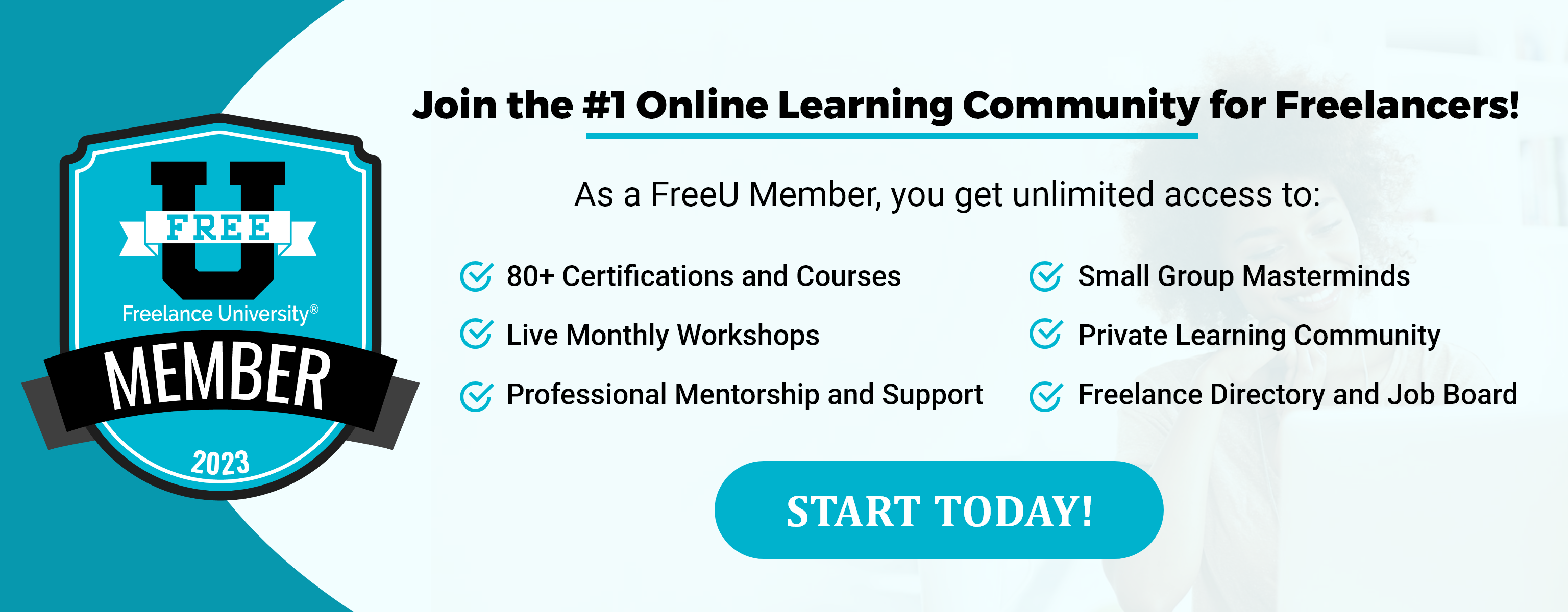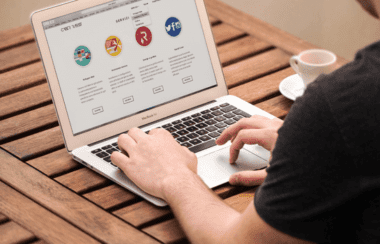Five Keys to a Winning Discovery Call
By Jena Kroeker

When you hear the words “discovery call,” how do you feel? Do you get sweaty palms and a racing heart? If so, you’re not alone. For many of us, just thinking about it makes us say, “Oh, great — this is where I’ll discover how tongue-tied I can get on a call.” It feels like an enormous hurdle to clear on our way to securing a contract with our ideal client.
But this hurdle isn’t as big as it seems, and it’s a challenge worth taking. My first discovery call opened the door to my entire freelance career over 20 years ago. And it was on an old push-button phone from the 1980s. The volume was unreliable, so I listened closely and took the call standing up so that I’d sound confident.
It was one of the most important calls of my life and the reason why I’m writing this article for you today.
And now, with better online communication tools and strategies, you can feel much more prepared than I did on that antique phone. So, let’s dive in and explore the keys to a winning discovery call.
What Is a Discovery Call?
First of all, let’s back up and define this sometimes anxiety-inducing term. In some cases, your sweaty palms and racing heart might come from associating discovery calls with job interviews you’ve experienced in the past. I know I’ve had some where I walked in the room, not knowing what I’d be asked. All I knew was that I had to come up with the right answers on the spot and sell myself. It’s a scary feeling.
However, a discovery call is “not a sales pitch,” as Craig Cannings explains in “The Winning Discovery Call” course at Freelance University. Rather, it’s a combination of these four elements:
• A conversation with a potential new client
• An opportunity to build a rapport and a connection
• A chance to learn about a prospect’s most current, pressing needs
• An opportunity to see whether a client is a good fit for YOU and your business.
And, in particular, as Forest Linden, the founder of Clarity Lab, explains,
“It is important to be authentic and come from a place of compassion and wanting to help people. You need to put your prospect’s need to solve a problem above your need to land a client.”
This advice can help calm your nerves by taking the focus off you and your performance.
And creating a solid foundation for communication can help too. So, as we did in a previous blog post, “Your Guide to Writing Effective Emails to Your Clients,” let’s build that foundation using the 5Ws (Who, What, Where, When, and Why). This will give you a well-rounded perspective to remember.
Five Keys to a Winning Discovery Call
1. Know WHO you’re talking to.
It’s a simple concept, I know. But it’s one that yields huge benefits when you take the time to prepare. First and foremost, make sure you know how to pronounce the client’s personal names and business name. As someone with difficult names to pronounce, I can attest to the fact that it’s a pleasant surprise when people learn beforehand or confirm the pronunciation at the beginning of the call. It shows they care.
Furthermore, In the course mentioned above, Craig Cannings recommends delving deeper by researching the prospective client’s business, market, and competitors.
When researching their business, you’ll want to explore their website, products, services, and social media presence. But also keep an eye out for potential areas that could be improved and ways you can offer valuable nuggets of wisdom during the call.
You can explore the market by researching relevant keywords, industry conversations in social media, related industry associations, and Google industry trends.
And finally, choose two or three competitors and observe their products, services, and web presence.
In an article titled “What is a Discovery Call, and Why is it Important,” Richard Conn sums up how you can use this information to springboard to the next step of the preparation:
“Whatever business you’re calling, make sure you look through the information they already have available and prepare questions that you don’t already know the answer to. It’s good practice, and means you’re not wasting company time for either of you.”
2. Know WHAT you’re talking about.
Now that you have the essential information at hand, you can prepare a list of questions and an agenda for the call. Craig Cannings recommends dividing a 30-minute discovery call into four parts:
• 5 minutes to connect with the prospect during the introduction
• 10-15 minutes to uncover their pain points and primary needs
• 5-10 minutes to share a solution to their problem and offer insights
• 5 minutes to answer any questions and communicate a clear follow-up plan with the prospect.
Within those parts, you can ask “general” questions about their business, “pain” questions about needs or challenges they have, and “specific” questions about their current project.
But be sure not to ask too many questions at once. In her article, “10 best sales discovery call questions — and why you should use them,” Rachel Williams warns,
“Asking too many questions confuses your prospect and you won’t get all the answers you need to position a potential solution and have a successful call. Take them one at a time to keep your prospect focused.”
3. Know WHERE to meet.
This element is entirely up to you and your prospect. Between the two of you, decide which mode of communication provides the most comfortable, productive meeting place. If you live in the same location, you have the benefit of choosing an in-person venue like a coffee shop, restaurant, or the prospect’s place of business. Just make sure you can find a quiet spot free from distractions.
If you don’t live in the same place, and your prospect is new to the online space, they may prefer a simple phone call. In that case, choose options like a landline or cell phone call. You can also use free audio conferencing from a tool like FreeConferenceCall.com.
And if your prospect is comfortable with technology and video calls, you have many good options, like Zoom, Google Meet, or Skype. Just be sure your software is both available and reliable so you can avoid any technical issues, as the article above advises.
4. Know WHEN to meet.
Here again, you’ll want to be sensitive to your prospect’s situation and needs. First of all, think about your own boundaries for meetings. You might want to suggest a time during your office hours to set the tone for future communications. But if your prospect has a busy young family, you might need to be flexible to accommodate their needs.
If prospects are new to technology, they might prefer simply emailing back and forth to determine a time. But if they’re comfortable using tools and apps, an online scheduling tool can work much smoother and allow you to build in your time boundaries for discovery calls. This software lets you provide a link so people can view your calendar and choose a meeting date and time.
Some options to consider are Acuity Scheduling, Calendly, and Book Like A Boss. Check them out to see which one works best for you. As an example, Book Like A Boss offers features like the ability to sync the booking calendar with your own online calendar, set your availability, and add email and SMS reminders, along with rescheduling and cancellation options for your prospects to use themselves.
5. Know WHY you’re meeting.
Here we return to Craig’s words at the beginning of this blog post. Throughout your discovery call, be sure to keep your goals in mind: to build rapport, develop trust, and understand the prospect’s pain points and challenges. Remember not to be too salesy, and don’t forget that as the client is assessing you, you’re also assessing whether both the client and the project are a good fit for you and your business. Ideally this call will result in the client moving to the proposal stage.
In her article, “Discovery call questions every freelancer should ask,” Kathleen Smith describes it this way:
“… the ideal talk that you’d have for this call is one of examining the project or needs at hand and then working with the client to share information (both from yourself to the client and vice versa) about what success looks like for their project. Be confident, honest, and willing to go off-script as you need to in order to achieve those goals for your discovery calls.”
So, as with many things in the freelance or virtual assistant industry, flexibility is key. Take advantage of the opportunity to improvise if you think of other pertinent questions that will further enrich your conversation.
Bonus: Know HOW to WOW your prospective client.
You may be familiar with this quote from Maya Angelou:
“I’ve learned that people will forget what you said, people will forget what you did, but people will never forget how you made them feel.”
At the end of the day, after all your preparation, it’s possible your discovery call might not go perfectly. You might encounter tech issues. Your dog might start barking. You might accidentally drop the piece of paper where you typed out your questions.
But your smile (in person or on video), your friendliness and authenticity (which can be communicated anywhere), and your genuine effort to ensure things run smoothly will shine through. All these work together to help build trust and provide the makings of a strong client relationship in the future.
And now we’d like to hear from you! How do you prepare for a winning discovery call? In the comments below, please share any strategies or tips that help you overcome nervousness and enjoy the process of meeting with potential clients!
If you are looking for a clear plan to start and grow your Freelance or VA Business from scratch, then be sure to download our FREE Start-up Guide!










































































































